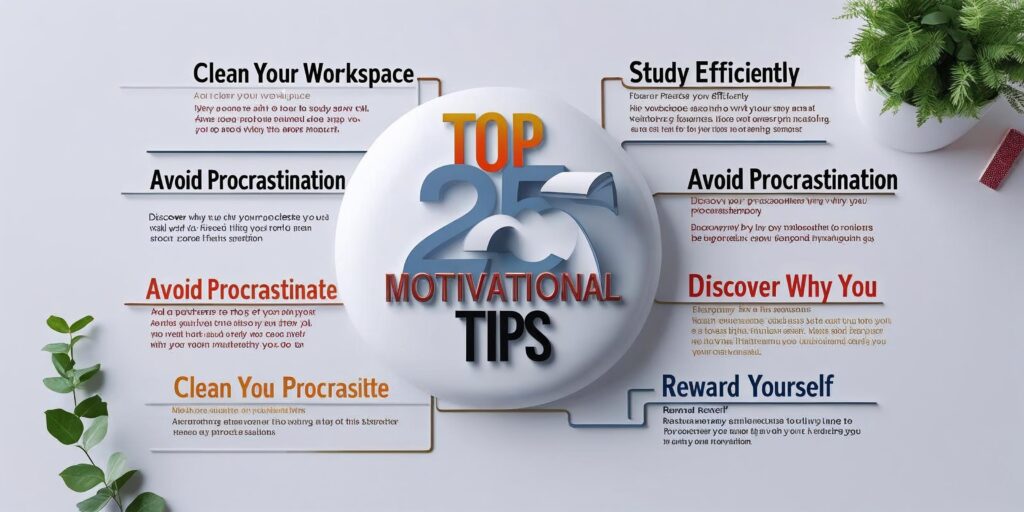Study Motivation in 2025: How to Stay Consistent and Score Higher
Why Motivation is Necessary

Hey friend, let’s get real. You and I both know the syllabus isn’t going to study itself.
In 2025, with social media notifications popping every 10 seconds and endless entertainment one click away, staying focused is harder than ever.
And here’s the kicker: talent alone won’t help you score high—consistency will.
Motivation isn’t magic—it’s a muscle. The more you train it, the stronger it gets.
And when you master self-motivation, you don’t need someone else to push you.
You push yourself, day after day, even when you don’t feel like it.
So now, let’s go step by step through 25 practical, beginner-friendly, and working-in-2025 tips.
It will help you stay on track, avoid procrastination, and score higher—for Indian students and professionals.
Top 25 Motivational Tips

1. Clean Your Workspace
A cluttered desk equals a cluttered mind. Before you even open your books, take five minutes to tidy up your study table.
Remove old notes, empty cups, and anything unrelated to your study session.
As a result, your brain associates this clean space with productivity, making it easier to focus.
Pro tip: Keep only the materials you need for your current task in front of you.
2. Study Efficiently
Working hard is good, but working smart is better.
Study during your peak focus hours—morning for most people.
Use active recall (testing yourself) instead of just re-reading.
On the flip side, don’t waste hours making notes that you’ll never read again.
Remember, efficiency beats long, distracted hours.
3. Avoid Procrastination
Procrastination feels comfortable in the moment but creates anxiety later.
In short, you’re trading short-term comfort for long-term stress.
The secret? Identify the smallest possible step you can take now—like opening your book or writing the first sentence of your essay.
4. Discover Why You Procrastinate
Sometimes, you’re not lazy—you’re avoiding discomfort.
Maybe the topic feels too hard.
Maybe you fear failure.
Understanding why you delay is the first step to fixing it.
Once you know the reason, you can apply targeted solutions—like breaking the task into smaller chunks or asking for help.
5. Reward Yourself
Our brains love rewards.
As a result, linking study time with small pleasures boosts motivation.
For example, after finishing two chapters, treat yourself to your favorite snack or watch a short video.
Just keep the reward proportional to the effort, so you don’t get distracted.
6. Set Goals
Without goals, you’re just drifting.
Instead of “I’ll study,” say “I’ll finish Chapter 5 by 8 PM.”
Clear, measurable goals make you accountable and give you a sense of achievement when you tick them off.
7. Take Breaks
Here’s the kicker: studying non-stop doesn’t make you a hero—it makes you burn out.
Short breaks refresh your brain and improve focus. Use them to stretch, hydrate, or get fresh air—not to binge-watch an entire series episode.
8. The Pomodoro Technique
Study for 25 minutes, take a 5-minute break, and repeat.
After four cycles, take a longer 15–30-minute break.
This beginner-friendly method keeps your focus sharp without exhausting you.
Pro tip: Use free tools like Pomofocus—no credit card required.
9. Act First and Motivation Will Follow
Waiting for motivation is like waiting for perfect weather—you’ll be waiting forever.
Start studying even if you don’t feel like it.
As a result, action creates momentum, and momentum creates motivation.
Discover More To Read
Unacademy: The Ultimate Guide to India’s Most Popular Learning Platform
How to Join the Indian Army in 2025
Boost Your Career with Free SWAYAM Certification Courses
Top Indian Colleges Offering MOOCs
10. Break Tasks into Manageable Chunks
Big tasks feel overwhelming.
The fast track? Break them into small, doable steps.
Instead of “Study Physics,” write “Read 3 pages of Newton’s laws” or “Solve 5 practice questions.”
11. Create a Schedule
Step by step, plan your study hours like appointments.
Use Google Calendar or a notebook.
Include deadlines and color-code subjects.
The more specific your plan, the less room there is for procrastination.
12. Create a Study Routine
Routines build discipline.
Study at the same time every day so your brain knows, “It’s study time now.”
Over time, it becomes a habit—no willpower needed.
13. Create a Study Space
Your brain links places to activities.
If you always study in bed, you might feel sleepy.
Instead, dedicate a quiet corner or desk for study only.
14. Don’t Wait for Motivation to Strike
If you wait to “feel ready,” you’ll never start. Bottom line: readiness comes after action.
Just open the book and begin.
15. Find Motivation Online
Watch short motivational clips, join student forums, or follow inspiring educators on YouTube.
But remember—don’t let inspiration time replace actual study time.
16. Find Your Learning Style
Some people learn best by reading, others by listening or doing.
Figure out your style—visual, auditory, or kinesthetic—and tailor your study methods to match.
17. Form a Study Group
Meanwhile, learning with others boosts accountability.
You explain topics to each other, share resources, and stay motivated as a team.
18. Just Start
The simplest yet most powerful tip—open your notes and read the first sentence.
Often, getting started is the hardest part, but once you begin, it flows naturally.
19. Look After Yourself
Your body fuels your brain. Eat balanced meals, get 7–8 hours of sleep, and move your body daily.
A healthy body sharpens your focus and memory.
20. Make Learning Fun
Turn concepts into games, quizzes, or flashcards. Use apps like Quizlet.
On the flip side, studying doesn’t have to be boring.
21. Remember Your Why
Keep your ultimate goal in mind—whether it’s a career, a dream college, or making your family proud.
That emotional connection is your long-term fuel.
22. Start With Something Easy
Ease into study mode by starting with a topic you enjoy.
It warms up your brain for tougher subjects.
23. Study With Other People
Accountability partners keep you consistent.
If you promised a friend you’d finish a chapter before meeting, you’ll push yourself to do it.
24. Visualise Yourself Starting
Before your session, close your eyes and imagine yourself sitting down, opening your book, and starting confidently.
It reduces resistance and makes action natural.
25. Clean Your Workspace Daily (Yes, Again)
Repetition matters. A fresh, clean study space each day signals to your brain—it’s go time.
Final Thoughts on Study Motivation in 2025: How to Stay Consistent and Score Higher—Take Action Today
Now that you have 35 actionable tips, here’s the bottom line: motivation grows through action, not before it.
Start with just one of these tips today. In short, don’t wait for the perfect moment—create it.
As a result, you’ll build habits that keep you consistent in 2025 and beyond.
Pro tip: Bookmark this article and revisit it whenever your motivation dips.
Because the fastest way to score higher isn’t magic—it’s mastering your daily discipline.
Frequently Asked Questions
How do you motivate yourself to study?
Remind yourself of your long-term goals and the benefits of achieving them, then take the first small step right now.
What are the top 3 motivations?
The top three motivations are personal growth, achieving meaningful goals, and improving quality of life.
What is the best line to study?
“Study now so your future self will thank you for the effort you put in today.”
How do I force myself to study?
Break your work into small, manageable tasks, set a timer, and commit to starting just one session without overthinking.




